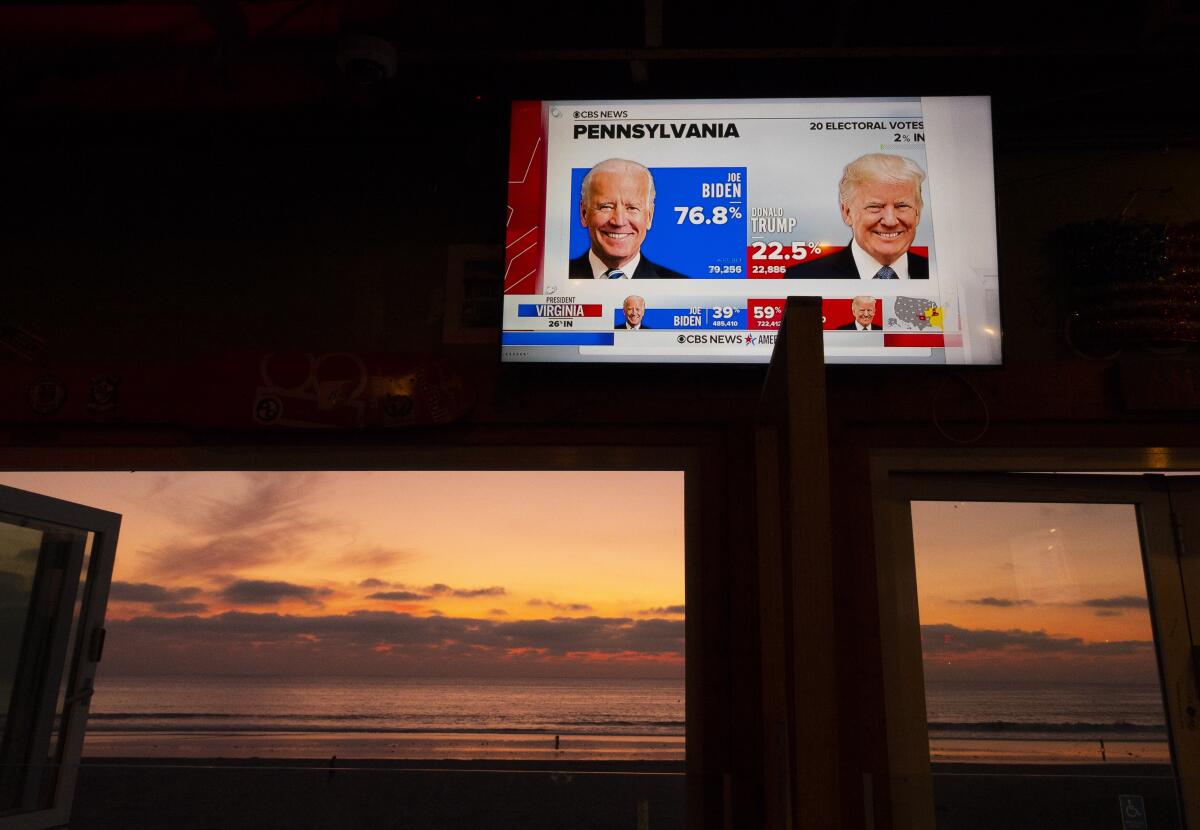Column: Elections shouldn’t be decided by courts. But this one could be

President Trump promised over the weekend that once the polls closed in Pennsylvania on Tuesday, “we’re going in with our lawyers.”
Kathy Barnette, Republican candidate for Pennsylvania’s 4th Congressional District, didn’t wait that long. She stormed into federal court as soon as the polls opened Tuesday, challenging Montgomery County’s procedures for processing mail-in ballots and for permitting voters to fix defective ballots.
A profound change has occurred in the country’s election process in the last 20 years, triggered by the U.S. Supreme Court’s imprudent decision in 2000 halting the close-vote recount in Florida and giving the presidency to George W. Bush by judicial fiat.
Every four years since, the role of lawyers and election litigation spikes anew. As bad as 2016 was, it’s nothing relative to the bedlam and teeming fields of battle this year, as hordes of lawyers for the candidates, the parties and third-party groups clog the courts with an array of lawsuits.
In the last few months, hundreds of election-related lawsuits have been filed in almost every state. They include cases challenging voter ID laws, voter signatures, absentee or mail-in ballot receipt deadlines, collection of ballots by third parties, drop-box use, what poll watchers can and can’t do, and more.
Several factors have made this election season particularly litigious. First, operating an election in a pandemic has led many states to try to increase flexibility for their voters, and those changes have drawn lawsuits.
Second, since 2018, the Republican National Committee is no longer bound by a consent decrees dating from a 1981 lawsuit alleging that a Republican group had engaged in illegal harassment and intimidation of minority voters. That decree, and the court oversight that came with it, expired in 2018, which means less outside constraint on the GOP. And less constraint translates into more lawsuits.
And then there’s President Trump, who made it clear all along that he would not necessarily accept the voters’ and states’ verdict before rushing into court to push the outcome toward the five solidly conservative Supreme Court justices, three of whom he appointed. As he told us , his latest court addition, Amy Coney Barrett, was rushed through confirmation expressly so she could be there for election-related lawsuits.
For Trump, a court win would be just how things are supposed to operate: As president, you install your cronies and then they scratch your back. It doesn’t seem to register with him that a variation on Bush vs. Gore in 2020 could be the biggest crisis for the court and the country since the Civil War.
Election-by-litigation is rife with dangers. It sets up the courts, the least accountable of the three branches of government, as the ultimate arbiter of democratic will. In a subtle but pernicious way, when an election is seen as preliminary to a Supreme Court decision, it alters the relationship of the electorate and the elected, muddling the source of the government’s power.
It also risks converting the nation’s verdict from a determination of democratic preference to an adjudication of legal rights. When normal political hand-to-hand combat is recast in terms of the law, it leaves those on the losing side feeling not that their candidate was the less-preferred but that he or she was robbed. The legal fight tends to be especially frenetic and embittering, given the outsize pressure that an undecided election can carry with it.
Pennsylvania has been ground zero in the election-as-litigation model this year, not because of any special legal feature but because it has figured as the quintessential swing state for 2020. Data show that more Democrats than Republicans make use of absentee/mail-in ballots, so Trump went on the warpath, alleging that Pennsylvania’s decision to count such ballots postmarked by Tuesday but received as late as Friday was a “blatant attempt to steal” the election for Joe Biden. No matter that 22 states and the District of Columbia count appropriately postmarked ballots after election day or that there is no evidence that absentee/mail-in voting procedures aren’t robust enough to prevent election stealing.
What Trump hopes for with his rhetoric and litigation fits a discreditable GOP 2020 playbook. The shocking motive behind most of the Republican efforts in court is the party’s desire to suppress the number of lawful votes overall, while the Democrats consistently battle to increase them. It is one thing to pursue get-out-the-vote strategies that favor one side or another — that’s politics as usual. But conniving to pull the courts into a campaign of voter suppression by law is just wrong.
Don’t misunderstand me: The electorate and the candidates have every right to count on legal compliance with the rules that govern elections, and to fight for that compliance in court. But it is an erosion of our political culture that instead of using the courts as a last resort in choosing our representatives, we are increasingly inured to shadow elections in the courts before and after the real ones at the ballot box.
Writing in the mid-19th century, Alexis de Tocqueville noted that “there is hardly any political question in the United States that is not sooner or later turned into a judicial question.” His famous observation has never seemed more prescient, or problematic, as it does on election day 2020.
@HarryLitman
More to Read
A cure for the common opinion
Get thought-provoking perspectives with our weekly newsletter.
You may occasionally receive promotional content from the Los Angeles Times.










